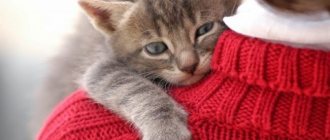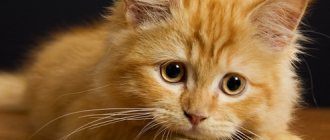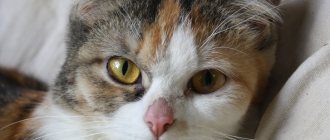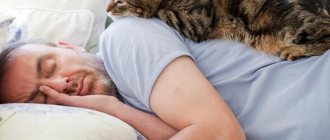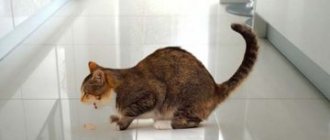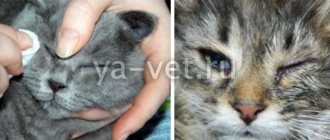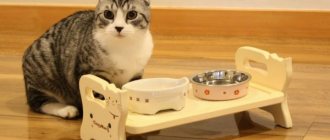Age: any
Symptoms: change in behavior, atypical aggression, refusal to eat, refusal of the animal to care for itself, reluctance to make contact, and others
We are accustomed to the fact that depression is a problem for people, but it turns out that our pets, in particular cats, can also suffer from this disease. Veterinary medicine encounters depression in cats quite often, although not all owners are aware of this problem. So what is it - depression in a cat ?
What can cause depression in a cat?
- Moving to a new place of residence. Cats are conservative creatures and often react negatively to changes in their lives. It takes them a long time to get used to new surroundings, new people, and smells. All this can disturb their peace and lead to depression.
- Disappearance of a loved one. Cats get used to a certain circle of people. They love some, they tolerate others, but if the composition of the family has changed, especially if the beloved owner is gone, the cat may experience severe anxiety. A similar condition occurs in dogs.
- Lack of attention. Domestic cats are very social. They need their owner's attention every day and if they don't receive it, they begin to get bored. This is especially evident in Siamese cats, which are more likely than others to become attached to people.
Causes of depression
In the modern world, it is very difficult to protect your pet from stressful situations. Do not forget that stress and depression in cats lead to a decrease in immunity and weaken the protective immune functions of the body. Needless to say, if animals are not in a psychological comfort zone, their behavior and habits change. Representatives of the Feline family, regardless of breed or age, strive for comfort and safety, but we should not forget that cats are very good at hiding their emotions.
When experiencing stress, an affectionate pet can turn into a little aggressor. Being in a depressed state, they may react inadequately to external stimuli and even begin to take revenge on their owners. And these are not all the problems that purr owners may encounter.
Causes of depression in cats:
- change of place of residence;
- a trip to the veterinary clinic;
- the presence of other pets in the apartment;
- change of owners;
- breed predisposition;
- the birth of non-viable, dead offspring;
- chronic, systemic diseases of various etiologies and genesis;
- changing your usual lifestyle;
- rude, dismissive attitude, lack of attention;
- age-related changes in the body;
- hormonal imbalance.
A cat can be thrown out of its psychological balance even by a sudden change in its usual diet or daily routine, new acquaintances, the constant presence of guests in the house, and even excessive attention from the owners. Exhibitions, mating, visits or visits from a veterinarian, hygiene procedures (bathing, treatment for ectoparasites), and insufficient attention from owners can also cause severe stress in cats.
In any case, the development of depression in cats depends on the influence of many factors, individual, physiological characteristics of the body, organization, and degree of excitability of the central nervous system. Animals, like people, have different temperaments. Pets can be choleric, sanguine, or melancholic, which largely determines their behavior, character, perception, and intensity of reaction to external stimuli. The seasons of the year affect the emotional state of furry pets. For example, in winter, many animals that roam freely on the street become depressed.
But you need to remember that stressful situations negatively affect the health of furry purrs and can provoke severe depression.
How to suspect depression in a cat?
- Behavior has changed. All cats have their own character, habits and habits, but if you notice that your pet’s behavior has changed significantly: he began to eat less or more, sleep, meow, this is a reason for concern.
- The cat has stopped grooming himself, his fur is dirty and looks sloppy. Or, on the contrary, the animal constantly licks itself nervously. All of these can be signs of depression.
- Noticeable hair loss, bald spots. Here it is necessary to differentiate the condition from seasonal molting.
- The cat began to defecate past the tray.
- Aggressive behavior: the cat began to bite, scratch, and hiss. All this indicates mental health problems in the animal.
- You should also suspect something is wrong if the cat suddenly begins to lead an overly solitary lifestyle: it often hides and is reluctant to make contact.
- Lethargy, apathy, decreased interest in the environment - all these are clear signs that the cat is bored.
Symptoms of depression
Each animal is individual in character and temperament. It is possible to determine that a pet is experiencing stress only by changing behavioral patterns and habits. In some pets, this condition manifests itself with pronounced symptoms, while in others, on the contrary, the symptoms of depression are mild.
Affectionate cats may show excessive activity or, conversely, become more withdrawn and depressed. Some individuals, on the contrary, attract the attention of their owners with uncharacteristic actions and heart-rending meows.
Signs of depression:
- depressed state, drowsiness, apathy;
- sharp increase, loss of appetite;
- weight gain;
- uncharacteristic behavior;
- deterioration of the coat, appearance of bald spots on the body;
- eating inedible objects;
- respiratory dysfunction;
- too excited state, aggression.
Cats that are depressed may not be seen by their owners, trying to avoid any contact. The pet, which regularly went to the litter box, begins to mark its territory, doing its “tricks” in the wrong places. Some pets, when under stress, show aggression or, conversely, become very affectionate, imposing their company on the owner.
It is very easy to identify the symptoms of stress and depression. You just need to take a close look at your pet’s behavior.
Diagnostics
It is important to understand that it is impossible to independently diagnose depression in an animal, since all the signs of this illness can accompany a number of diseases, many of which pose a serious threat to the health and life of the pet. Therefore, if you notice that your cat is behaving strangely, do not put off a visit to the veterinary clinic. Doctors will examine your animal, take tests, check the condition of internal organs, and if the cat turns out to be physically healthy, then a mental disorder can be considered the probable cause of deviations in its behavior.
Treatment
Unfortunately, there are no specialized drugs developed for cats. In severe cases, the veterinarian may prescribe medications from the category of antidepressants: MAO or SSRI. But these drugs have serious side effects and it is better to try to do without them.
First of all, you need to fight the animal's boredom. If a person has acquired a pet, he needs to play with him more often, talk, comb him, in a word, spend time communicating with the cat. If the cat is left alone for a long time, you need to leave the doors to the rooms open and do not close the curtains. This will allow your pet to have fun while looking outside. Today there are special videos for sale that are designed for cats.
If a cat has seasonal depression, veterinarians advise purchasing a white lamp and turning it on for several hours in the presence of the animal. Such lamps are used in greenhouses. Veterinarians recommend artificial pheromones for some cats. This will lift your pet's mood and ease depression. If an animal shows aggression, it may be prescribed sedatives.
How to treat depression in a cat?
First of all - attention. Offer your pet a game, pet it gently, and talk in a calm voice. The animal must feel safe and psychologically comfortable. Treat your cat to his favorite treat, arrange a comfortable place for sleep and privacy. In general, provide excellent care for your cat throughout. Eliminate all stressors as much as possible. Also, to normalize the condition, the doctor may prescribe general strengthening drugs and medications to correct the animal’s mental state. Medicines are selected on an individual basis.
Also, often in cases where the owner does not have the opportunity to provide the animal with proper care, but communication and attention, or if a sociable cat is too hyperactive for the owner, it is often recommended to get another animal so that the cat does not feel lonely when you are busy or absent. You shouldn’t be afraid that the animal will completely switch from you to its new playmate, but you should remember that everyone’s characters are individual and a lot depends on you, too. If the animal is very jealous, you still shouldn’t resort to such a solution - it can aggravate the situation. We should also not forget about the possibility that animals may not get along with their personalities, including among themselves.
The doctors at the Amis clinic are ready to provide your cat with qualified care. Come and we will select an effective course of treatment for your pet.
How to help an animal
Experts advise paying more attention to your pet, brushing its fur more often, communicating with it, pampering it with treats, you can even feed it from your hands.
If you discover any incomprehensible symptoms, you should contact a veterinarian as soon as possible so as not to confuse the manifestations of depression with symptoms of a more serious disease, diagnose which only a specialist can do. If depression is confirmed, your pet's condition can be alleviated in the following ways:
- taking mild sedatives on a natural basis (only as prescribed by a veterinarian);
- changing the diet (there are foods created specifically for cats that often experience stress);
- eliminating all possible irritants (remove the collar, replace inconvenient bowls for water and food);
- unobtrusive behavior (do not stroke or pick up the animal against its will);
- providing freedom of movement and play.
The right approach, unobtrusive attention, warmth, affection and love for the pet are the key to the fact that over time its mental state will certainly normalize and the cat will again delight its owners with its usual behavior.
How to cheer up a depressed cat?
Although cats can experience depression, there are many things you can do to help them improve their mental health.
Spend time with your cat
To help a depressed cat, you can spend more time with it. Simply sit with them and pet them to calm a depressed cat.
Some cats enjoy being scratched behind the ears and stroked on the face or under the chin, or even being brushed.
Give your cat new toys and games
You can also try to get your cat interested in life again by involving her in other activities or offering her new toys of different sizes, textures and colors.
Actively participate in play using toys like fishing rods to entice your cat. You can also offer puzzle toys to encourage your cat to prepare tasty treats, or toys that move across the floor in unusual patterns or make interesting sounds.
Download cat games on your mobile devices to attract your cat, or subscribe to cat TV.
Offer new types of food
Some cats may show interest in different flavors or brands of food, or even human food, such as boiled or fried chicken, yogurt, or cheese.
Other cats may respond well to meat-based baby food. Before feeding your cat human food, ask your veterinarian to confirm the type and amount of food.
Play soothing music
There is calming music designed specifically for cats that you can find on YouTube, such as a channel called Music for Cats, which may appeal to some cats. The music contains basic tracks of cats purring and other frequencies of sounds that cats can hear.
Try supplements
There are natural supplements containing l-theanine and l-tryptophan that can increase serotonin levels in a cat's brain to help combat depression. Serotonin is sometimes called the “feel good” neurotransmitter, and higher levels are associated with feelings of calm and happiness.
Use pheromones and invigorating scents
Cat pheromones can calm cats. You can also offer your cats different scents, such as peppermint, catnip, and rosemary, to stimulate their senses.
Consider getting another cat
Some cats may enjoy the company of other cats. However, careful consideration is required.
Even if your cat was very social with the previous cat who passed away, getting another cat may not be the right answer.
Your resident cat may not want to replace her recently departed friend.
Get professional help
You may also want to talk to your veterinarian regarding psychoactive medications for your cat. Ask your veterinarian to recommend a personalized treatment plan and medications that will help your cat.
Remember the latest changes
If your cat is showing signs of depression, you need to think about what changes have happened in the house recently. Stability and a calm environment are very important for cats; any changes can upset the pet’s psychological balance.
Moving to another home, as well as separation from someone close (human or other animal) can be stressful and negatively affect the cat's condition.
Owners should also consider whether they are paying enough attention to their furry friend. Cats, despite their apparent independence, are mostly social animals. They need communication with their owners, care, affection and attention. In the absence of this, they may become depressed.
Stress factors
Loneliness and lack of attention from the owner can negatively affect a cat's health.
Many people are accustomed to thinking that stressors can only be psychological in nature, but in fact there are several types:
- Physical - the impact of temperature on the cat (burn, frostbite, sudden change from cold to hot and vice versa), humidity, sunstroke, electric shock, painful injuries with extensive damage to the body and heavy bleeding.
- Chemical - this group includes any toxic or irritating substances that can lead to poisoning (household chemicals, medications, etc.). By the way, even tobacco smoke blown into a cat’s nose for the sake of a joke, or the smell of alcohol can cause stress.
- Biological – prolonged fasting, insufficient supply of nutrients and vitamins, infections of any etiology (viruses, fungi, bacteria).
- Mental stressors are probably the largest and most common group of stressors in cats, which would be worth dwelling on in a little more detail.
Prevention measures
If the cat satisfies its hunting instincts, depression will recede. You need to entertain the animal, play with it, giving it the opportunity to get emotional release. Don't run to the store for special toys.
There are quite a few items around the household that can be chewed, torn, disturbed, rolled, shaken, grabbed, tossed: toilet paper, balls of yarn, clothespins, boxes, wine corks, paper bags, crumpled up candy wrappers. A cat can be easily interested in a moving spot of light cast by a flashlight, laser pointer, or mirror.
Such games will be a salvation for owners whose pets like to play with inappropriate things: furniture, carpets, curtains, shoes. A bully, the animal will forget about boredom and loneliness. His intellect will develop, and his physical form will improve.
The danger with feline depression is that it can be difficult to recognize. Often, apparently healthy animals experience mental discomfort for years, from which they cannot recover on their own, and their owners believe that everything is fine with their pets, they have simply matured and calmed down.
Treatment for depression will take a long time, and its result depends entirely on the cat owner, on how much love, care and time he is willing to spend on it. Disease is easier to avoid, especially since little is required. The animal needs to be provided with competent care, monitor its physical health, pay attention and not let it get bored, then there is no need to be afraid of depression.
Sources
- https://moja-koshka.ru/zdorove-koshek/depressija-u-koshek.html
- https://KotMurka.ru/bolezni/depressiya-koshek.html
- https://4lapki.com/2019/02/depressiya-u-koshki
- https://lapulik.com/o-koshke/bolezni_i_lecheni/nervnoj-sistemy/depressiya.html
- https://life-instyle.com/o-sokrovennom/13773-byvaet-li-depressiya-u-koshek-i-kak-ee-raspoznat.html
[collapse]
